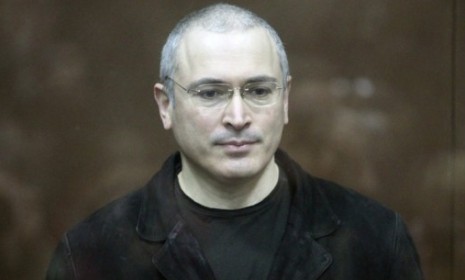Russia's tycoon 'show trial': Is Putin abusing his power?
The U.S. has strongly criticized the guilty verdict handed to jailed oil billionaire Mikhail Khodorkovsky. Was the Russian prime minister controlling his "Kafkaesque" trial?

A free daily email with the biggest news stories of the day – and the best features from TheWeek.com
You are now subscribed
Your newsletter sign-up was successful
After a trial described as "Kafkaesque," a "farce," and a "show," one-time Russian oligarch Mikhail Khodorkovsky has been found guilty of stealing 350 million tons of oil from his own companies, a crime some say would be all but impossible to carry out. The verdict handed down by a Russian court has been heavily criticized by the U.S., with Secretary of State Hillary Clinton saying it would have a "negative impact on Russia's reputation." Khodorkovsky — already in jail after a 2003 conviction for fraud and tax evasion — was an outspoken critic of Vladimir Putin, the former president turned prime minister, and many consider this ruling a form of revenge. Is this justice, or has Putin taken a personal vendetta too far?
Khodorkovsky is paying for taking on Putin: Khodorkovsky's "real crime" is posing a threat to Putin, says The Economist. He refused to be a "servile manager of Russia's natural resources," funded opposition parties, and lobbied against the former president's aim of "building an oil-fueled authoritarian regime." It was essential to that regime to have him jailed. This verdict is the clearest evidence yet that Putin has a near-dictatorial control over everything in Russia — even the law.
The Week
Escape your echo chamber. Get the facts behind the news, plus analysis from multiple perspectives.

Sign up for The Week's Free Newsletters
From our morning news briefing to a weekly Good News Newsletter, get the best of The Week delivered directly to your inbox.
From our morning news briefing to a weekly Good News Newsletter, get the best of The Week delivered directly to your inbox.
Khodorkovsky's corruption cannot be ignored: When he was free, says Eric Kraus at Market Oracle, Khodorkovsky helped the oligarchy grab power over the Russian populace. This is a man who was "as guilty as the worst of his peers" when it came to stealing resources from Russia, but "refused to cease and desist" when Putin's "purposeful government" challenged him. He is the Bernard Madoff of Russia.
"Is Putin pitiable, or the FT corrupt?"
Putin is flexing his muscles: The jailing of this tycoon has "become a central part of the narrative of Mr. Putin's political career," says Roland Oliphant at The Daily Telegraph. The "ruthlessness" with which he has destroyed Khodorkovsky and his company, Yukos, is "no less important to Mr Putin's macho image than photo opportunities with tigers or shots of him swimming in Siberian rivers." Letting Khodorkovsky go would be tantamount to releasing his grip on power.
"Analysis: Khodorkovsky verdict confirms Putin's grip on power"
A free daily email with the biggest news stories of the day – and the best features from TheWeek.com
This is a sad sign for the future of Russia: If this case proved anything, says Owen Matthews at Newsweek, it's that Russia's authorities are "weak, and scared." Rather than illustrate Putin's effortless power, it has shown that the Kremlin is "afraid of showing what it sees as weakness." The "ham-handed" trial displayed a "dangerous amateurishness." Putin's totalitarianism may be scary, but "incompetent totalitarianism is actually scarier." Rather than usher in reform, Russia is still rotting under "bureaucrat-kleptocrats."
-
 How the FCC’s ‘equal time’ rule works
How the FCC’s ‘equal time’ rule worksIn the Spotlight The law is at the heart of the Colbert-CBS conflict
-
 What is the endgame in the DHS shutdown?
What is the endgame in the DHS shutdown?Today’s Big Question Democrats want to rein in ICE’s immigration crackdown
-
 ‘Poor time management isn’t just an inconvenience’
‘Poor time management isn’t just an inconvenience’Instant Opinion Opinion, comment and editorials of the day